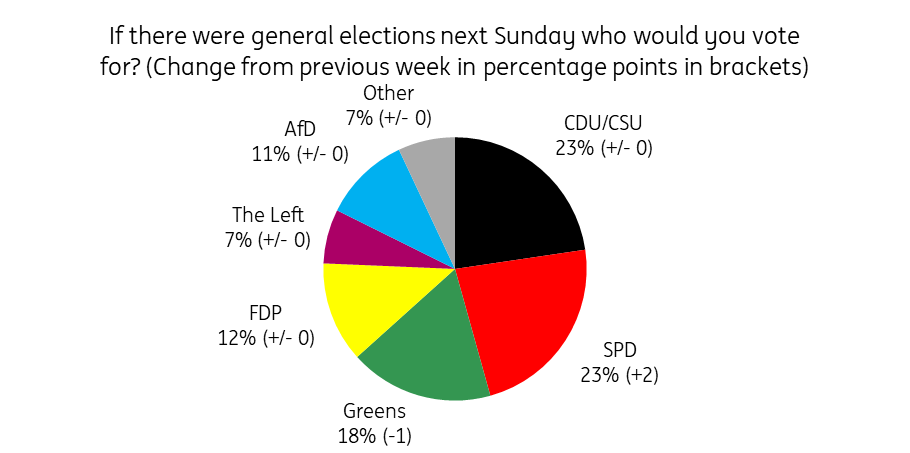Germany votes: Comeback of the SPD
Last night's first tv debate seems to have confirmed the current momentum in German election politics. While the SPD keeps its positive momentum, the CDU is struggling to regain it
Another week, another set of fresh polls. And all recent polls confirm that the momentum is currently clearly with finance minister Olaf Scholz and the SPD. While some weeks ago, the SPD was still at some 15% of the votes, it currently ranges at around 23%, the best performance in 15 years. Some polls have the SPD already leading the CDU, which continues its downward trend and has approached the 20% level. Even if Germans do not vote their chancellor directly, the popularity of the Spitzenkandidaten leaves its marks on the parties’ performance in the polls. Olaf Scholz is currently by far the most popular of the three Spitzenkandidaten, with some 34% of the votes if Germans could vote the chancellor directly. Armin Laschet from the CDU was at 12% and the Greens’ Annalena Baerbock at 13%. Only the unknown “None of the above” remains close to Olaf Scholz with 30%...
German elections weekly voting

Last night’s first television debate of the three Spitzenkandidaten was the kick-off for the last campaign weeks. The debate finally brought content back into the campaign. For the international audience, however, it should be interesting that topics like fiscal policy or Europe were hardly discussed at all. To some extent, it looks as if the German electorate (or the makers of the tv debate) had more interest in the next chancellor’s abilities as crisis manager and not so much in the structural and more fundamental challenges for the German economy. According to a first poll immediately after the debate, Olaf Scholz ‘won’ the debate with 36%, Annalena Baerbock received 30% and Armin Laschet 25%.
The rise of the SPD and the fall of the CDU has completely opened the options for the next government coalition.
The rise of the SPD and the fall of the CDU has completely opened the options for the next government coalition. In fact, everything seems possible. From a CDU, Greens and FDP coalition (known as ‘Jamaica coalition’ due to the parties’ official colours) to a SPD, Greens and FDP government (known as the ‘Traffic light’ coalition) to a SPD, CDU and Greens coalition (known as the Germany coalition). Even a SPD, Greens and Left Party coalition could be possible. All of this points to very long coalition negotiations after the elections and an increasing probability that Angela Merkel could still be chancellor at the end of this year.
The rise of the SPD, however, does not necessarily mean that Olaf Scholz will automatically become the next chancellor. As it currently stands, the FDP could be kingmaker, deciding between ‘Jamaica’ and ‘Traffic light’. Given that the FDP is traditionally politically closer to the CDU than the SPD, a ‘Jamaica’ coalition, even with a CDU not being the largest party after the elections, could be possible.
Scholz and the SPD have become the ones to beat.
Last night’s debate illustrated how the political landscape in Germany has changed over the last weeks. Scholz and the SPD have become the ones to beat, while Laschet and the CDU as well as Baerbock and the Greens have become the challengers, which had to shift into the attack mode. This promises an exciting campaign in the final weeks until the elections on 26 September.
This publication has been prepared by ING solely for information purposes irrespective of a particular user's means, financial situation or investment objectives. The information does not constitute investment recommendation, and nor is it investment, legal or tax advice or an offer or solicitation to purchase or sell any financial instrument. Read more
Download
Download snap